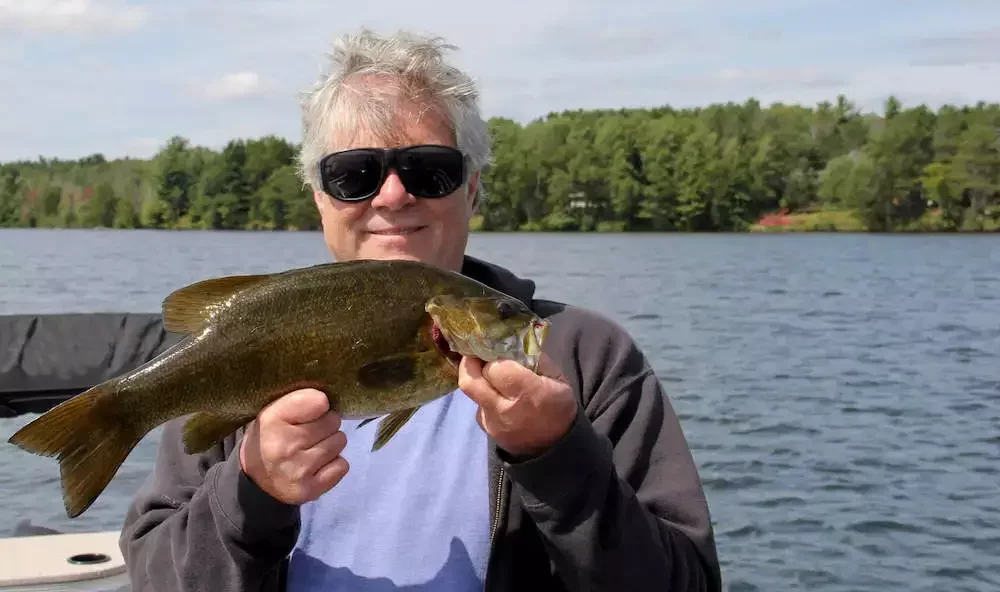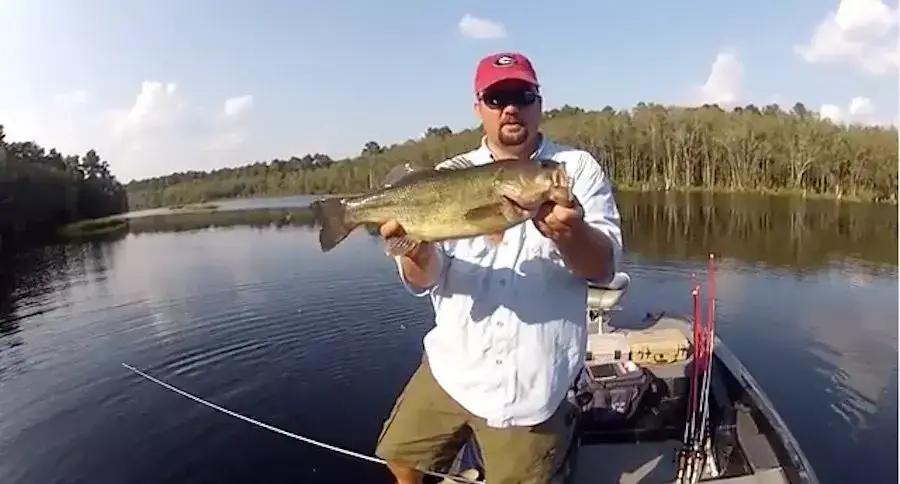Do you want to catch more fish this season? If so, you need to learn how to lip a bass. This is one of the most important skills that a fisherman can have.
Liping a bass is an effective way to get them in the boat. This blog post will teach you how to do it like a pro.
Why Is It Necessary to Keep a Bass?
When you lip a bass, it is important to hold the fish firmly to avoid getting bit by the fish. Bass has very sharp teeth and can inflict a lot of damage if they get free.
By holding the bass securely, you will minimize the chances of being bitten. In addition, keeping the fish still will help you determine how it will respond when you release it back into the water.
The more calm a fish is the better chance of surviving after being released. If your catch is squirming or struggling, you need to get a hold of the situation before releasing them back into the river or lake where they were originally caught.
Another reason why it is important to hold the fish securely when you lip a bass (or any other species of fish) is because they are quite strong and agile creatures.
They have powerful jaws which can easily rip through flesh and bone if given enough time or space.
If your grip isn’t firm enough, then there may come a time when the fish breaks free and causes some serious damage.
How To Hold A Bass

When you lip a bass, it’s important to hold the fish securely. You don’t want to drop it or let it go. Here are three tips for how to hold a bass:
- Grip the fish gently but firmly with your thumb and forefinger. Don’t squeeze too hard, or you’ll damage the fish.
- Wrap your other hand around the base of the fish’s tail. This will help you keep a grip on it as well.
- Hold the bass horizontally, so that its belly is facing up and its head is pointing toward you. Never hold a live fish vertically. It could damage itself from thrashing against gravity.
Now that you know how to hold bass, it’s time to learn how to lip it. Keep reading for tips on how to do this correctly.
How to Lip a Bass Like a Pro
There’s more to fishing than just casting your line and hoping for the best. If you want to catch more bass this season, you need to learn how to lip them.
Liping is a technique that can be used when bass are feeding near the surface. It involves using a specialized lip gripper to grab the fish by the lower lip quickly.
When you use a lip gripper, it’s important to know how and when to do it correctly. So here are some tips for how to lip a bass like a pro:
- Use your hands instead of pliers if possible; this will make gripping easier because you’re able to get better leverage on the fish’s mouth.
- If you’re using pliers, make sure they have a good grip on the fish’s lip and that the jaws are closed tightly.
- Don’t use too much force when gripping the bass; you don’t want to injure it. Gently squeeze the lip until you have a good hold, then quickly remove the gripper from the fish’s mouth.
- If you have trouble gripping due to slippery skin or algae buildup on your hands, try using rubber gloves for better traction.
You can also use other grips when catching basses, such as a lip hook or braid line tied around their lower jaw. But these methods aren’t recommended because they can cause more harm to the fish.
Liping is a quick, easy, and humane way to catch basses feeding near the surface. So give it a try next time you’re out on the water.
The lip gripper is an essential piece of equipment for any bass fisherman. When used correctly, it can help you catch more fish and make your fishing experience more enjoyable.
If you’re new, here are some tips:
- Make sure the gripper is in good working order with no loose parts or damage before each use.
- Never store live bait inside of an open container such as this one—it will cause contamination and the bait will die.
- Check the size of your bass against the size markings on the gripper to make sure you’re using the right one.
- Lubricate the jaws before each use with cooking oil or a similar substance; this will help them grip better and cause less damage to the fish’s lip.
The lip gripper is a handy tool to have in your fishing arsenal, and with a little practice, you’ll be liping bass like a pro.
If you’re having trouble catching bass near the surface, try using a lip gripper. It’s an easy way to grip the fish by the lower lip and quickly remove it from the water.
Make sure to check the size markings on the gripper to make sure you’re using the right one, and lubricate the jaws before each use with cooking oil or a similar substance.
What Type of Bait Should I Use?
There are many different types of bait that you can use when fishing for bass. Some people prefer to use live bait, such as minnows or worms, while others prefer artificial lures.
It depends on what type of fisherman you are and what you feel most comfortable using.
However, if you are starting, you should probably stick with something simple like a plastic worm since these are easier for beginners.
Two different artificial lures can be used when fishing for bass: soft plastics and hard plastics.
Soft plastics come in many shapes, sizes, and colors, making them great options if you’re looking to catch more fish.
They tend to be less expensive than hard plastics, but they also don’t last as long and may break easily if mishandled.
Hard plastics are typically made from plastic or metal and come in various shapes, sizes, and colors.
Most people prefer these because they’re more durable than soft plastics, so you won’t have to worry about breaking them as easily.
They’re also typically more expensive than soft plastics, but they can last for many years if properly taken care of, so they may be worth it in the long run.
Will the Bass Fight Back?

Once you have the bass lip hooked, keeping tension on the line while playing the fish is important. Big bass can put up a good fight, so be prepared for some battle tactics.
Keep your drag set light and use your hand to guide the rod as you reel in the fish. Don’t try to jerk or pull too hard on the fish, or you may end up losing it.
The bass will try to swim away from you and toward deeper water. You’ll need to use your rod to keep the fish close to the surface so you can continue playing it.
If the bass gets too far away from you, reel in some line and then let it out again so the fish can swim closer to you.
When the bass gets close to the boat, use your net to scoop it up and into the boat. Congratulations—you’ve lip a bass. Now it’s time to clean and cook it for dinner.
How long can I lip a bass?
Bass are very tough fish that can be caught and handled with no problem. However, if you do not want to damage the fish, make sure it is still alive before liping them out of the water.
However, there are some times when lipping a bass may cause too much damage to its mouth and should be avoided.
For example, if you are fishing around rocks or other hard objects that can scratch the bass’ mouth, liping is not recommended.
It would help if you also avoided liping a fish that has already been hooked and is bleeding from its gills or eyes. This will make it easier for another angler to get their line into the water before yours.
Where should I go fishing?
This is a question that many anglers face, and the answer can be complicated. Some factors you might want to consider are the time of year, the type of water body, what species of fish you’re targeting, and your experience level.
However, if you’re looking to catch largemouth bass, one of the best places to start is at a lake.
Lakes offer diverse habitats and plenty of opportunities for anglers, but they can also be intimidating if you don’t know what to look for.
Luckily there are some easy ways that any beginner can learn how to find largemouth bass in lakes.
How do I lip a bass?
Lip a bass is when you grab the fish by its mouth and hold it up out of the water. This will give you more control over where they go, which can help prevent them from getting away while you’re trying to remove your hook or lure.
You might think that this would be easy, but there are some important things to remember if you want to ensure that you don’t injure the fish.
When liping a bass, it’s important to use a landing net so you can easily scoop the fish into the boat. It would help if you also avoided jerking or pulling too hard on the fish, as this can damage its mouth and make it harder for another angler to get its line into the water.
Conclusion
Liping is a great way to remove hooks or lures from bass without damaging them. It’s also an easy task that any angler can learn with some practice and patience.
Liping requires you to use two hands, one for holding onto the bass by its mouth while the other pulls out your hook or lure.

